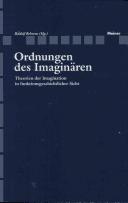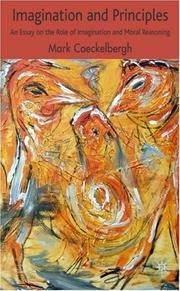| Listing 1 - 10 of 127 | << page >> |
Sort by
|

ISBN: 3787315888 Year: 2002 Volume: 2(2002) Publisher: Hamburg Meiner
Abstract | Keywords | Export | Availability | Bookmark
 Loading...
Loading...Choose an application
- Reference Manager
- EndNote
- RefWorks (Direct export to RefWorks)
Book
ISBN: 9782080712882 2080712888 Year: 2006 Publisher: Paris Flammarion
Abstract | Keywords | Export | Availability | Bookmark
 Loading...
Loading...Choose an application
- Reference Manager
- EndNote
- RefWorks (Direct export to RefWorks)
Book
ISBN: 9782204097192 2204097195 Year: 2012 Publisher: Paris Cerf
Abstract | Keywords | Export | Availability | Bookmark
 Loading...
Loading...Choose an application
- Reference Manager
- EndNote
- RefWorks (Direct export to RefWorks)
S'il était un empire de l'imagination, ce serait moins celui du réel que celui du refuge fantastique, de l'imaginaire. Dès lors, il est capital de redonner à l'imagination sa juste place dans une philosophie de l'action. L'imagination est le médiateur de la créativité. Elle est la faculté du possible pratique en nous ancrant poétiquement au monde. Les images fournissent un cadre herméneutique pour l'agir. Elles augmentent notre intelligence du réel et testent notre capacité a nous investir. En ces termes dominés par la rationalité instrumentale et le contrôle, voire l'évaluation tous azimuts du vécu, reconnaître la place des puissances de l'imagination est devenu tâche urgente pour habiter autrement notre monde !
Book
ISBN: 0367708779 1003153429 1000785750 1003153429 Year: 2023 Publisher: London, England ; New York, New York : Routledge,
Abstract | Keywords | Export | Availability | Bookmark
 Loading...
Loading...Choose an application
- Reference Manager
- EndNote
- RefWorks (Direct export to RefWorks)
This book explores the structure and function of memory and imagination, as well as the relation and interaction between the two states. It is the first book to offer an integrative approach to these two emerging areas of philosophical research. The essays in this volume deal with a variety of forms of imagining and remembering. The contributors come from a range of methodological backgrounds: empirically minded philosophers, analytic philosophers engaging mainly in conceptual analysis, and philosophers informed by the phenomenological tradition. Part 1 consists of novel contributions to ontological issues regarding the nature of memory and imagination and their respective structural features. Part 2 focuses on questions of justification and perspective regarding both states. The chapters in Part 3 discuss issues regarding memory and imagination as skills or powers. Finally, Part 4 focuses on the relation between memory, imagination, and emotion. Philosophical Perspectives on Memory and Imagination will be of interest to scholars and advanced students working in philosophy of memory, philosophy of imagination, philosophy of mind, and epistemology.
Book
ISBN: 0140195904 Year: 2002 Publisher: London Penguin
Abstract | Keywords | Export | Availability | Bookmark
 Loading...
Loading...Choose an application
- Reference Manager
- EndNote
- RefWorks (Direct export to RefWorks)
Imagination (Philosophy) --- Mythology --- History
Book
ISBN: 1875792317 Year: 2000 Publisher: Brisbane IMA Publishing
Abstract | Keywords | Export | Availability | Bookmark
 Loading...
Loading...Choose an application
- Reference Manager
- EndNote
- RefWorks (Direct export to RefWorks)
Art --- Imagination (Philosophy) --- Philosophy

ISBN: 023055279X 9780230552791 Year: 2007 Publisher: Basingstoke Palgrave Macmillan
Abstract | Keywords | Export | Availability | Bookmark
 Loading...
Loading...Choose an application
- Reference Manager
- EndNote
- RefWorks (Direct export to RefWorks)
Book
Year: 2018 Publisher: Göttingen : Konstanz University Press,
Abstract | Keywords | Export | Availability | Bookmark
 Loading...
Loading...Choose an application
- Reference Manager
- EndNote
- RefWorks (Direct export to RefWorks)
Kant's reflections on animals open up a hitherto overlooked approach to his conception of human intuition and imagination. In her book, Rahel Villinger shows how Kant's aesthetics, epistemology, and theory of history become completely readable against the background of the assumption of animal cognition through intuition and imagination. Kant as a frigid thinker of human reason, who sees in the forces of sensuality nothing but immorality and animal lethargy: this prejudice is still widespread. In fact, sensuality for Kant is an intrinsic and independent faculty of knowledge through intuition and imagination. Kant radically upgraded sensuality, which was independent of reason, from the rationalistic school philosophy of his day and also against the newly emerging philosophy of German idealism. We need the imagination of other animals to be able to think our own and to critically push the boundaries. Therefore, an imagination of animals with Kant includes both: the notion of a superhuman power of purely sensual intuition and imagination whose singularity and immediacy reflect the perfection and infinity of divine intuition; and the specific imagination of rational animals, whose descriptive activity combines image and writing, vividness and concept, and which becomes possible only through the imagination of their premature origin - their animal prototype. The guide to his reflections on animals thus reveals a hidden ambiguity in Kant's thinking of sensual nature, which determines the foundations of modern aesthetics, poetics, and pictorial theory.
Book
ISBN: 9788875645748 Year: 2012 Publisher: Napoli Loffredo
Abstract | Keywords | Export | Availability | Bookmark
 Loading...
Loading...Choose an application
- Reference Manager
- EndNote
- RefWorks (Direct export to RefWorks)
Book
ISBN: 9780415739481 9781315657905 9781317329435 9781317329442 9781138574076 Year: 2016 Publisher: London Routledge
Abstract | Keywords | Export | Availability | Bookmark
 Loading...
Loading...Choose an application
- Reference Manager
- EndNote
- RefWorks (Direct export to RefWorks)
"Imagination occupies a central place in philosophy, going back to Aristotle. However, following a period of relative neglect there has been an explosion of interest in imagination in the past two decades as philosophers examine the role of imagination in debates about the mind and cognition, aesthetics and ethics, as well as epistemology, science and mathematics. This outstanding Handbook contains over thirty specially commissioned chapters by leading philosophers organized into six clear sections examining the most important aspects of the philosophy of imagination, including: Imagination in historical context: Aristotle, Descartes, Hume, Kant, Husserl, and Sartre; What is imagination? The relation between imagination and mental imagery; imagination contrasted with perception, memory, and dreaming; Imagination in aesthetics: imagination and our engagement with music, art, and fiction; the problems of fictional emotions and 'imaginative resistance;' Imagination in philosophy of mind and cognitive science: imagination and creativity, the self, action, child development, and animal cognition; Imagination in ethics and political philosophy, including the concept of 'moral imagination' and empathy; Imagination in epistemology and philosophy of science, including learning, thought experiments, scientific modeling, and mathematics." -- Publisher's descriptionImagination occupies a central place in philosophy, going back to Aristotle. However, following a period of relative neglect there has been an explosion of interest in imagination in the past two decades as philosophers examine the role of imagination in debates about the mind and cognition, aesthetics and ethics, as well as epistemology, science and mathematics. This outstanding Handbook contains over thirty specially commissioned chapters by leading philosophers organised into six clear sections examining the most important aspects of the philosophy of imagination, including: Imagination in historical context: Aristotle, Descartes, Hume, Kant, Husserl, and Sartre What is imagination? The relation between imagination and mental imagery; imagination contrasted with perception, memory, and dreaming Imagination in aesthetics: imagination and our engagement with music, art, and fiction; the problems of fictional emotions and `imaginative resistance' Imagination in philosophy of mind and cognitive science: imagination and creativity, the self, action, child development, and animal cognition Imagination in ethics and political philosophy, including the concept of 'moral imagination' and empathy Imagination in epistemology and philosophy of science, including learning, thought experiments, scientific modelling, and mathematics. The Routledge Handbook of Philosophy of Imagination is essential reading for students and researchers in philosophy of mind and psychology, aesthetics, and ethics. It will also be a valuable resource for those in related disciplines such as psychology and art.
Philosophical anthropology --- Imagination (Philosophy) --- Imagination (Philosophy). --- Philosophy of mind --- History.
| Listing 1 - 10 of 127 | << page >> |
Sort by
|

 Search
Search Feedback
Feedback About UniCat
About UniCat  Help
Help News
News